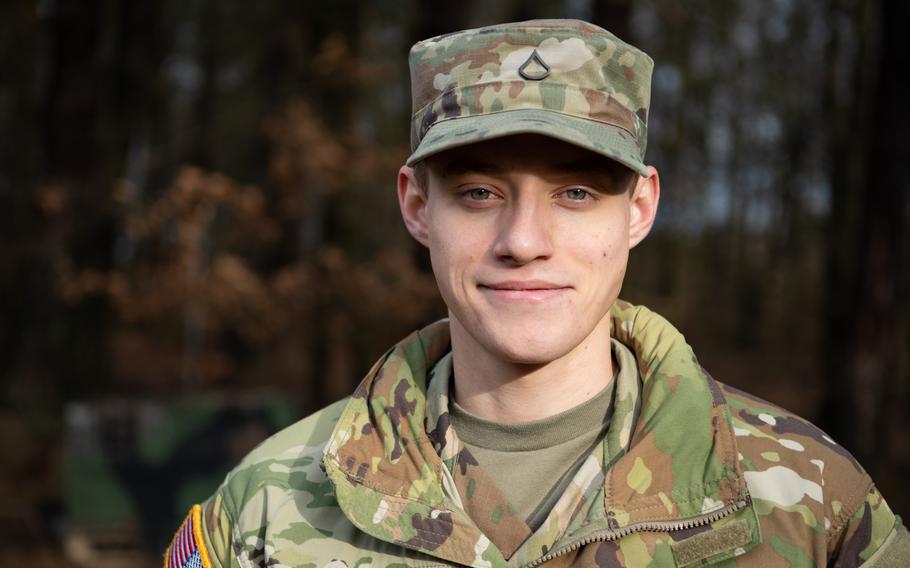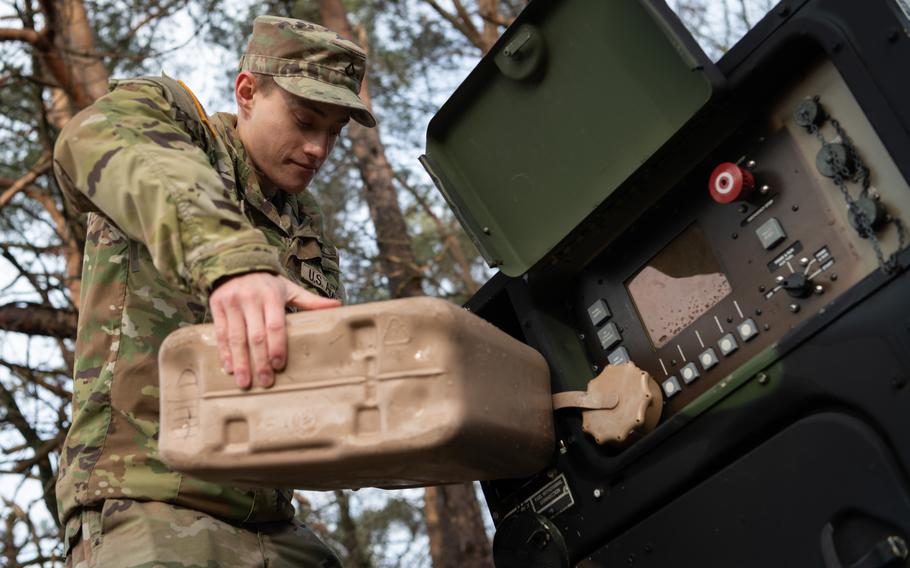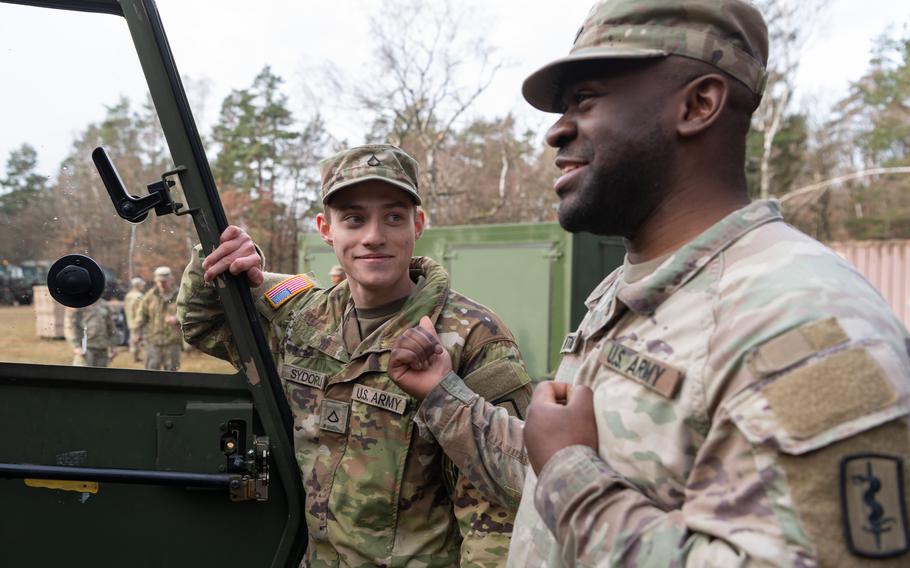
Pfc. Andrii Sydoruk, a Ukrainian immigrant who joined the U.S. military in late 2022, has earned two Army Commendation Medals for his work translating for Ukrainian forces and the Americans teaching them to operate air defense systems. (Phillip Walter Wellman/Stars and Stripes)
KAISERSLAUTERN, Germany — Pfc. Andrii Sydoruk traded the night shift at a California grocery store for an unexpected role in preparing soldiers from his native Ukraine for their fight against Russia.
The 21-year-old immigrant enlisted with the U.S. Army to manage fuel supplies.
But soon after he arrived at his first duty station in Germany in July 2023, he took on assignments as a translator between American trainers and Ukrainian troops learning to operate advanced defense systems.
The equipment and the training Sydoruk supported are part of the more than $40 billion in military assistance that the U.S. has given Ukraine since Russia launched its full-scale invasion of the country two years ago.
As the conflict enters its third year on Saturday, military leaders say more assistance is needed to help prevent a Russian victory, which they argue would have global security implications and could make the U.S. less safe.
Sydoruk has pledged to offer his linguistic assistance whenever it’s needed.
“The work I do with the Ukrainian soldiers is going to be 1,000 times more important than if I just stay here,” Sydoruk said recently at Rhine Ordnance Barracks, where he carries out his regular work as a petroleum supply specialist.

Pfc. Andrii Sydoruk fuels a machine during a training exercise Feb. 9, 2024, in Landstuhl, Germany. The petroleum supply specialist has served as a linguist for Ukrainian soldiers learning to operate American air defense systems. (Phillip Walter Wellman/Stars and Stripes)
So far, he has helped the Ukrainians learn to operate air defense systems, including Patriot missiles, which Ukraine is using to protect its cities and infrastructure.
Though Sydoruk is fluent in Ukrainian and Russian, he’s not a trained linguist. He’s also not an air defense specialist, meaning he had to learn about the systems and the highly technical terms associated with them, terms he’d never used before in any language.
“It’s been stressful,” Sydoruk said. “If I translate something wrong and they learn something wrong, it could be very bad. Not only could they die, but a thousand people could die.”
The work with Ukraine is deeply personal for Sydoruk, who grew up in the western city of Mohyliv-Podilskyi. He moved to Southern California with his mother and brother in 2018 in search of a better life.
When Russian troops invaded Ukraine from three sides on Feb. 24, 2022, he was employed at a Los Angeles grocer and continuing a long-distance relationship with his girlfriend Sonia, who lived in the eastern Ukrainian city of Mariupol.
Before he immigrated, Sydoruk used to ride 18 hours on a train to see her there.
A three-month siege killed thousands and destroyed most of Mariupol. Clashes forced the survivors to stay indoors, where they didn’t have heat, running water or electricity. Eventually, Sydoruk lost contact with Sonia.
She managed to flee the city for the Czech Republic. Sydoruk quit his job to go see her but couldn’t stay long because of green card restrictions.

Pfc. Andrii Sydoruk and his fiancee Sonia. (Andrii Sydoruk)
Back in California, he was so desperate to find a way to be closer to her that he considered doing something he thought he’d never do: become a soldier.
His mother, Ganna Kravtsova, had been encouraging him to join the military before he was even old enough to enlist. But he never believed he had it in him. The lifestyle seemed too strict and physically demanding.
He changed his mind when he learned that the Army would allow him to start his service in Europe. It also would provide him with a quicker pathway to citizenship, meaning fewer travel restrictions.
He deployed to Germany to support the headquarters detachment for the 519th Hospital Center, a subordinate of the 30th Medical Brigade and the 21st Theater Sustainment Command.
Many soldiers in the 21st, the largest American overseas command of its kind, are doing work that supports Ukraine’s defense efforts.
This work is often linked to the movement of American weapons, equipment and supplies from European ports to transit points on NATO’s eastern flank for delivery to Ukraine.
Capt. Christopher Lee, the headquarters detachment commander, helped Sydoruk find supplemental linguist missions.
“I’m always looking at something that is touching that conflict in some way,” Lee said, referring to the Ukraine-linked missions he finds for soldiers. “I try to brief them that what we’re doing is very important, because really, we’re looking at the potential destabilization of Europe.”
Similar sentiment has been expressed at higher levels within the U.S. military. Still, as Ukrainian forces remain hindered by low ammunition and supplies, additional U.S. aid for the country hasn’t been approved by Congress.
Last week, Russia captured the eastern city of Avdiivka, and there are fears that more territory could be lost if U.S. funding doesn’t come through.

Andrii Sydoruk, right, poses with his mother, Ganna Kravtsova, and older brother Igor Kravtsov in the United States after the family immigrated there from Ukraine in 2018. Sydoruk joined the U.S. Army in 2022 and is stationed in Germany. (Andrii Sydoruk)
Sydoruk said most of the Ukrainian soldiers he worked with weren’t afraid of death but worried about what would become of their families without them. Many have young children. Still, they always were eager to complete their training and return to the battlefield, he said.
Sydoruk has earned two Army Commendation Medals for his translation work, making him one of the most decorated soldiers of his junior rank in the 21st Theater Sustainment Command.
The awards underscore the importance the Army gives to the Ukrainian training missions.
Meanwhile, Kravtsova gets to be proud of her son’s role without having to worry about his safety.
“This is his contribution to the future, for a future Ukrainian victory,” she said during a recent phone call from California.
He’s made that contribution while also being able to use long weekends to go see Sonia, who recently became his fiancee. His U.S. citizenship, earned in July, should allow her to follow him to his next posting in a couple of years.
When asked how it felt to have earned his medals after less than two years served, Sydoruk smiled and downplayed the accomplishment.
“The best thing is just being able to participate in missions like those (with the Ukrainian soldiers),” he said. “Whenever I see on the news what they’re doing, it makes me happy.”

Pfc. Andrii Sydoruk, left, and Spc. Celestin Ntomb converse during a training exercise in Landstuhl, Germany, Feb. 9, 2024. (Phillip Walter Wellman/Stars and Stripes)